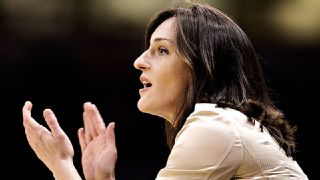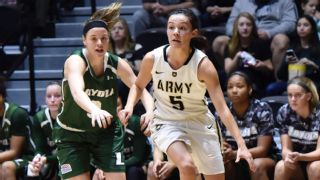Kelsey Minato recalls her first weeks as a West Point cadet as little more than a blur. She remembers the final trips to favorite restaurants with friends near home in Huntington Beach, California, aware she wouldn't be back for many months. And there was a quick stop in New York City to see the sights with her family. She remembers reception day at the United States Military Academy, when new cadets report to the iconic institution on the banks of the Hudson River in New York and begin a 47-month process to emerge as commissioned officers.
Then things get jumbled. The memories run together from weeks of cadet basic training that stretched through summer. Each long day of drills, training and activity spilled into another. Yet one experience sticks out. While most of basic training, informally known as "Beast," proved less impossible than she had imagined, the task of rifle qualification -- demonstrating sufficient accuracy on the firing range with an M16 -- bedeviled her.
"I was getting help from other cadets, I was getting help from the [upperclassmen] cadre members, even some of the soldiers there that were helping us," Minato said. "I just couldn't do it. I don't know if I was just exhausted because it was hot and I was out there for like 12 hours. I was sad, just because I couldn't qualify my rifle and everyone else did. It was frustrating for me."
She eventually qualified. Not only that, she did so with a sharpshooter designation for accuracy.
So began the career of the greatest marksman in West Point basketball history.
That career continues when Army and Navy play in Madison Square Garden on Saturday. As the 10-year anniversaries of both Army's first NCAA tournament appearance and former Army coach Maggie Dixon's death at 28 years old approach this spring -- two events inexorably bonded by the respective joy and sorrow they engendered and the brief time that separated them -- what Minato has accomplished is a new chapter in the story.
What Dixon envisioned, Minato embodies.
The only team in the Patriot League to beat Army this season, Bucknell did so at home earlier this month only after enduring Minato's 35 points on 16-of-26 shooting. After that game, the team's second win in seven tries against Minato, Bucknell coach Aaron Roussell listened to people offer congratulations for a strategy as bold and daring as to allow Minato her shots and instead focus defensive attention on stopping her mortal teammates.
"I kind of laughed," Roussell admitted. "And I was like, 'We weren't trying to give her hers; we were trying to stop her.' She still had 35, and it was an easy 35. Even going back and watching film, I told my assistants, she took 26 shots and I thought 24 of them were going in."
Minato is a career 42 percent shooter from the 3-point line, best among all active Division I players. A season ago, she made 234 field goals, 139 free throws and totaled 81 assists, 554 touches that led directly to points. She turned over the ball just 42 times.
"There's not a lot of kids that can do everything," Roussell continued. "And she can do everything and then some."

Some realized that sooner than others. For Russell McClurg, the realization came long before Minato scorched the Patriot League with regularity or scored 23 points at Duke this season and 27 points in an NCAA tournament first-round game at Maryland as a sophomore. It came even before McClurg coached her at Huntington Beach High School, where she earned the starting point guard role as a freshman and eventually set the school scoring record. He saw it when she was still in grade school: the even-keeled composure, the flick of the wrist, the body control. Small and quiet, she exerted an outsized gravitational pull on those around her even then.
Minato is likely at some point soon to break the career scoring record for Patriot League women's basketball, a record Bucknell's Molly Creamer set more than a decade ago and which nobody since has come within 500 points (the equivalent of almost a full season) of matching. In that sense, she occupies the same sort of real estate as another product of a service academy whose talents exceeded those normally found in the Patriot League. But it isn't former Navy All-American David Robinson to whom McClurg compares the 5-foot-8 Minato (and even that official height might be generous).
"You look at Stephen Curry and you look at her, and they're very similar," McClurg said of the NBA star who played collegiately at Davidson. "They're both undersized -- even when you're 6-2, they didn't look at that as great size in the NBA. Both have just overcome so much. They're unassuming players. You sleep on them and all of a sudden they've scored 30 points."
So he was all the more befuddled when so few Division I programs expressed interest in her. It's why she was still uncertain of her plans as a high school senior when Army, along with Sacred Heart, New Mexico State and Division II schools in California, reached out. The email from Army associate coach Colleen Mullen sat unopened in her inbox for a few days. Although there is a history of military service in Minato's family, including a great-grandfather and grandfather who served in World War I and II, respectively, it wasn't a life to which she had given any thought. She didn't know anything about West Point, other than the vague knowledge that it had a military connection.
With only weeks remaining in a process that the academy recommends prospective applicants begin during their junior year, she decided to apply. She told other schools she wanted to go to Army. She hoped the academy wanted her. She admitted she didn't have much in the way of a backup plan.
"I kind of came to the realization that I didn't want to have a typical college experience," Minato said. "I wanted to be challenged. I wanted to be at a place where every day is going to present a new opportunity, a new challenge and a new experience. I don't know, it almost felt like going to a normal college would be a bit boring. What West Point offered was appealing."
Which is why unlike Curry or Creamer, who turned her Patriot League success into an opportunity to play professionally in the WNBA, Minato will not be playing in that league or any other after she graduates this spring. She will instead be commissioned as a second lieutenant and report for field artillery training, a sentence presumably rarely written about someone who once hit four 3-pointers in a game in Cameron Indoor Stadium.
Still understated, she was nonetheless voted by her peers as chair of the student-athlete advisory committee at West Point. She is a leader. And the chance to soon put into practice those skills developed over the past four years appeals to her. Field artillery, where she will serve a portion of her initial five-year commitment before moving to the signal corps, is largely new territory for women. Army's final game this season, which it hopes will be in the NCAA tournament for the second time in Minato's four seasons, will also be her final basketball game.
"It's really sad for me to think about," Minato said. "Basketball is all I've known my entire life, just the routine of going to practice and then having games on the weekend. Just the whole basketball life is part of my DNA. The thought of not having that in my life is a really sobering thought. But it's also made me appreciate the time that I have with my teammates this year, more than any other year, just because I know it's going to end soon."

No matter what records are broken or championships won, that will always be the case for athletes at West Point. It is always part of the story.
It was part of what made the 2005-06 season so magical.
Current Army coach Dave Magarity, who coached former NBA No. 2 overall pick Rik Smits, among others, during decades in the men's game, doesn't come across as someone prone to sentimentality. He tells an old coach's often funny and occasionally profane stories, what in any other setting might be called war stories. But the tenor of his voice changes when the conversation shifts to Dixon, the young coach who talked him into leaving an administrative job to join her at Army. He talked about her, too, when Army, with Minato as Patriot League Player of the Year, returned to the tournament in 2014.
"I showed them film of [the 2006 Patriot League championship game], I showed them the reaction when we won the game and all that stuff," Magarity said of Dixon's legacy. "The fabric of this place because of the impact she had -- she was only here for six months, it's incredible. She's such an important part [of the program]. You come to our offices here and you see it. It's something I always wanted to make sure we keep alive. Our kids know who she is."
They know not just because she won at a place where circumstances make that difficult but because of how she went about it. Because service was as important as the success. More than the points, more than the postseason appearances, that, too, is Minato's legacy. Odds be damned, succeed and serve.
"I think Maggie would have cherished having somebody like her," Magarity said.

